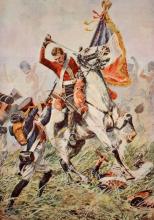inspiration + perspiration = invention :: T. Edison ::

Two momentous events occurred today. The one everyone's talking about is Napoleon Bonaparte's defeat at Waterloo in 1815, 200 years ago. The other is the return of new content to my blog, dormant since April. The would-be Emperor of Europe and I have both been absent for awhile, though mine was more due to getting behind rather than losing an army; we actually have very little in common (especially not defeat after a second wind, I hope).
But on that note: Waterloo is a major milestone in the history of the modern world. It ensured the terms of the Congress of Vienna would stick, proved English supremacy, and swept forward a new age in Europe, not to mention coining a nifty little catchphrase.
These kind of watershed moments always lend themselves to alternate timelnes. The Alternate History Weekly Update referenced a few, including a historian who claimed a French victory would result in Napoleon gaining back dominance over the continent and even China (something Temeraire might object to).
I agree with the Alternate Historian: such a future sounds incredibly optimistic. As I pointed out in a comment, the real question for a reversal at Waterloo is: at what cost? In the actual timeline, Naploeon's losses were estimated at 33,000 (according to History.com), while the combined Brit/Prussian forces lost around 22,000. Even if Napoleon won that day, it would probably have been with a simarily high body count. High casualties with little real military gains might dim optimism among potential recruits and popular support in the nation, still leading to his defeat. As that other little saying goes, you can win the battle and still lose the war.
But low casualties or at least higher casualties on the other side might go a long ways for propaganda purposes, especially if Waterloo was followed by a more substantial campaign. At the time, Naploeon's enemies in the Seventh Coalition included Austria, Great Britain, Prussia, and Russia. His strategy had been to win quick victories to bring them to the negotiation table, but I think a different outcome at Waterloo would have only sharpened their resolve to get rid of the "outlaw," as they called him. Nothing unites a group more than a common enemy, and after a costly defeat all would be out for blood.
So, where to go next? Britain's navy is still large and in charge on the seas in 1815 and the Prussians are holding strong in the German territories. Russia is completely out of the question (or China, for that matter). I originally suggested Spain, fuzzily recalling that Napoleon's brother didn't do so well in Italy, but some quick research proved I got that exactly backwards. Joseph Bonaparte was a disaster in Spain (sparking a populist uprising) while he did relatively well in Naples.
Either way (via Sicily or Gibralter), I think the best bet for Napoleon would be to go into Africa and do what he did best: get the locals on his side by exploiting their discontent with someone else. The slave trade's very big at this time, and colonization in Africa is just beginning. If Napoleon could somehow get involved in the Cape Colony or inspire a pan-African alliance to his cause, he might really shake things up for his enemies.
Of course, as the Alternate Historian also pointed out, Napoleon doesn't have long after Waterloo to do much: he died in 1821, a bare six years later. Even with victory at Waterloo and several more battles (maybe in Italy, Africa, or even the German states), I don't see him ever taking back the territory of his first empire, and certainly not creating anything lasting beyond France for his family or heirs.
But if he had meddled in Africa, possibly arming and training native forces to use against his European opponents, the outcome would have been far greater than whether or not these people spoke French today. A united, trained African militia could have made colonization far more costly and difficult, while the innovations Napoleon may have brought to the region would inspire new movements and even modern nations. These possibilities are for more intriguing to me than whether or not a French-speaking Europe would still have fought the 20th century's world wars.
If you'd like to try your own hand at helping Napoleon win, play the BBC's Battle of Waterloo Game. You can command the battle as either Napoleon or Wellington (the British commander). I had more luck with Napoleon: I was able to lead the French to victory more than once, while I kept blundering with the British forces. The gift of hindsight, perhaps.
The best and most long-lasting part of Napoleon winning Waterloo, though, would be its effect on pop culture. To "meet one's Waterloo" might now be a term for a surprise victory. We might cherish "The Charge of the Royal Sctos Greys" as the ballad for futile efforts in war rather than Tennyson's later poem about the Crimea. The Waterloo rail station would have a different name, though ABBA might still have used the battle's name for its hit single (pop music is completely unpredictable).
I'd love comments on what other cultural touchstones would change if Napoleon had one, such as the impact on fictional characters and works. Also: if things had gone differently all those years ago, what would have been the man's eventual Waterloo?





